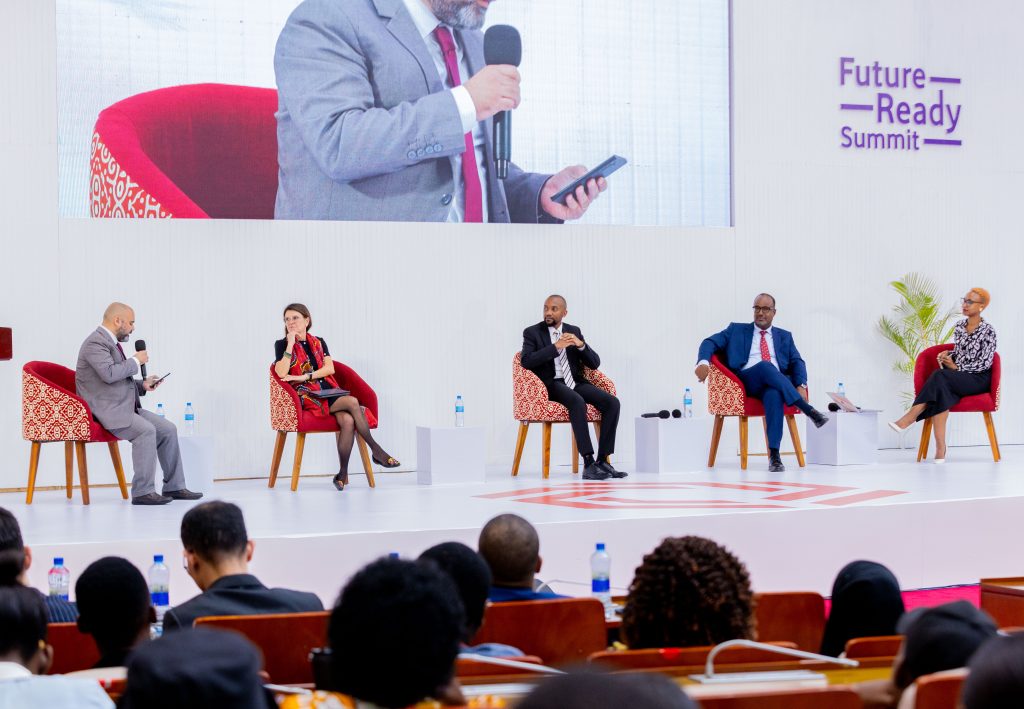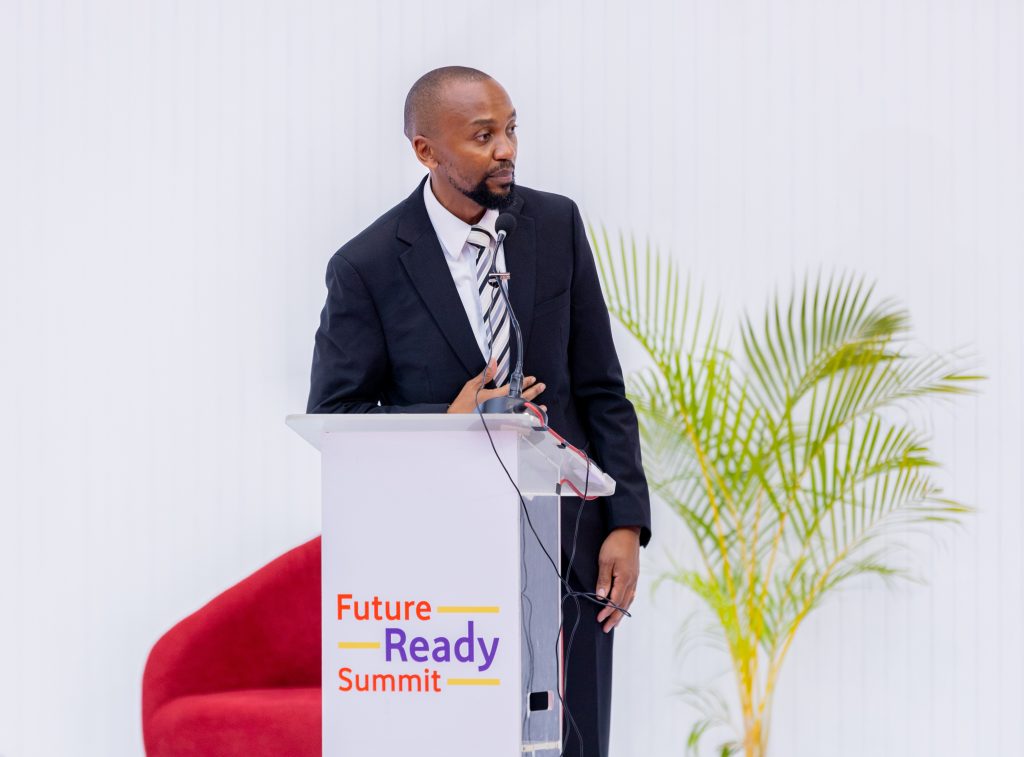The discourse on digital technology in Tanzania, like in many other parts of the world, has been structured by the imperative of inclusion and access for years. Whether mobile connectivity or affordable devices, the assignment has been to ensure everyone can access the technology in question, seeing exclusions along gendered, income, or geographic lines as the problem to be overcome while quite often failing to ask whether the inclusion is meaningful.
For instance, increased digital infrastructure has not led to increased digital technology adoption and usage, if anything it has had the opposite effect and amplified existing socio-economic inequalities.
This is the reality in Tanzania, especially for rural communities, women, and girls. What can be done to accelerate change?
For Phillip Besiimire, Vodacom Tanzania’s Managing Director, the answer lies in decisions about how technology can be financed and governed.
Speaking at a high-level panel session on Empowering the Future: Nurturing the Right Digital Skills for a Symbiotic Relationship between People and Technology at Vodacom Tanzania’s inaugural Future Ready Summit alongside Sofie Maddens, Chief a.i Digital Knowledge Hub Department at ITU, Nathan Belete, Country Director at World Bank Tanzania and Nelson Rodrigues, Innovation Specialist at UNICEF Tanzania, Besiimire pointed out that solving for barriers to digital adoption will require collaborative, multi-stakeholder efforts.
‘There is not one entity that can solve our challenges. This has to be done as an industry,’ shared Besiimire.
During the panel session, Besiimire also shared his views on areas of intervention, what Vodacom Tanzania is doing to resolve the challenges, and how other stakeholders, the government especially, can support.

However, before delving deeper into Vodacom MD’s recommendations on how we can reduce barriers to digital adoption to achieve digital parity, it may be worth understanding the barriers contributing to the current state of digital adoption and usage in the country and informing Besiimire’s recommendations.
The State of Digital Adoption and Usage in Tanzania
While the Tanzanian Government has done well in ensuring a majority of Tanzanians are connected to the internet, 2022 data from the GSMA suggests that only 26% of Tanzanians are connected or use either 3G or 4G services in a country with 81% mobile network coverage.
The 55% usage gap is attributed to the high cost of compatible digital devices, a sentiment that is also shared by Besiimire, who holds that ‘the more technology becomes sophisticated, the more gadgets become expensive. A 4G enabled device costs about $60.’ Consequently, few Tanzanians own smartphones or devices that are 4G enabled; the majority of users have 2G compatible phones, which are cheaper but limit their access to the internet.
Further exacerbating the cost of mobile devices are the taxes and levies which push the affordability of these devices further out of reach for mobile users in rural areas and marginalized groups.
Read related: IoT Revolution in Tanzania: Pioneering the Digital Age.
Another key barrier to digital adoption is low levels of digital skills and awareness among Tanzanians. According to the Digital Skills Gap Index (DSGI) by Wiley, a tool used by policymakers, educators and recruiters to help bridge the digital skills divide, Tanzania has a score of 3.3 out of 10 for digital skills, which indicates a low level of awareness and skills among its population.
This has implications on their ability to access information online, e-government services, and digital jobs and opportunities among other things. Equally, the low digital skills impact the utilization of e-government services making it difficult to get reliable customer feedback that can inform the improvement of public service delivery.
Another barrier is the lack of an integrated identification system across all systems, public and private, that require identification. Currently, Tanzania has a number of initiatives to register Tanzanians’ identities, including voter identity cards, SIM card biometric registration, and a national identity card, with the national identity being more widely recognized and used.
However, up until 2021, NIDA had only registered 22 million Tanzanian citizens, a third of the country’s population. This presents a big challenge in protecting Tanzanians from online fraud and creates levels of distrust of the internet. It will also present challenges in rolling out a digital identity system in the future.
Ultimately, these barriers and others not mentioned above contribute to Tanzania’s low digital adoption and usage. For Tanzania’s citizenry, this translates to being excluded from enjoying the benefits of digital technology. For the Tanzanian Government and the private sector, particularly the MNOs, the underutilization of the infrastructure also makes it difficult for them to recoup their costs and generate revenue.
Recommendations to Increase Digital Adoption and Usage
With that context in mind, these are the recommendations from Vodacom Tanzania’s MD, Phillip Besiimire, on how we can increase digital adoption and usage and achieve digital parity:
- Putting Devices in The Hands of Tanzanians
As previously mentioned, 4G enabled devices are expensive and will remain inaccessible to Tanzanians if nothing is done about it. Besiimire believes that more Tanzanians can access 4G devices if they are provided with a more flexible way to buy them, otherwise known as device financing, and if they can access the devices at reduced prices.
To deliver on this, Vodacom Tanzania has partnered with local financial institutions and startups to enable its customers to access 4G-enabled devices by putting an initial down payment of up to 40% and paying the balance in small instalments. It is also working on a global initiative with other African telecommunication operators and the ITU to bring down the cost of devices as an industry.
- Creating Policy Interventions on Taxes and Local Content
At the policy level, Besiimire calls on the Tanzanian Government to consider two policy interventions. The first policy intervention is on taxes imposed on devices. ‘4G enabled devices are expensive. They are about $60. $60 plus 18% VAT takes the devices out of reach of so many people. Taking that 18% away is a step in the right direction,’ points out Besiimire.
Besiimire’s suggestion to the Tanzanian Government to reconsider the elimination of VAT on devices has been challenged by the government because it did not bear the desired results in the past.
The second policy intervention area is on local content. Besiimire believes that “Putting devices in people’s hands without local content for productive use presents another challenge. We have e-government services, for example, that need to be made available on these devices.’
The assumption is that with more e-government services available online and accessible through mobile phones, Tanzanians will have more reasons to go online and do productive things. However, it should be noted that low levels of digital skills have a role to play in online content availability and utilization.
Digital Identity for All, NIDA Uptake a Necessity
From Besiimire’s perspective, ‘Going digital without an identity is a challenge.’ The challenge has to be solved to ensure that Tanzanians are able to register for and access services online, especially as the world turns to digital identification. While the MD recognized the efforts by NIDA thus far, he implored the government agency to work harder to get more Tanzanians registered.
For digital inclusion to be meaningful, it must include everyone and result in positive outcomes for a majority of the population, if not all. This may require a multi-faceted approach to addressing the barriers to digital adoption and usage. Vodacom Tanzania’s Managing Director’s recommendations and approach are one way to approach the challenges of digital adoption. What is your approach?

